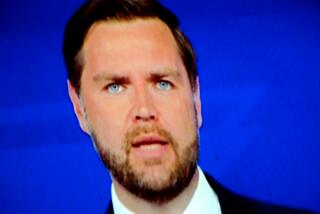Gore’s Ace in the Hole
- Share via
WASHINGTON — Texas Gov. George W. Bush and Vice President Al Gore face off Tuesday in the first of three presidential debates. For Bush, the debates may be his only chance to win. For Gore, they are his only chance to lose. For both, the three 90-minutes debates will be the most important 270 minutes of their lives.
Do presidential debates really matter? In close races since 1960, presidential debates have often been the deciding factor--and this is a close race.
In 1960, then-Sen. John F. Kennedy trailed Vice President Richard M. Nixon through much of the fall campaign. The margin was close until the two debates. After winning both, Kennedy pulled ahead and won the election by a razor-thin margin.
In 1976, President Gerald R. Ford, who trailed former Georgia Gov. Jimmy Carter badly in the summer, closed the gap quickly in the fall. Then, in a presidential debate, Ford declared Poland free of Soviet domination. His momentum stopped, and he lost.
In 1980, President Carter and former California Gov. Ronald Reagan were locked in a virtual dead heat through the fall. Voters wanted Carter out, but Reagan seemed too risky--until their only presidential debate. Reagan’s genial personality seemed anything but scary. After the debate, the floodgates opened, and Reagan won easily.
None of these races is comparable to Bush-Gore 2000, but each provides lessons. Of the three, the 1960 race may be the most relevant. Then, as now, voters had reservations about both candidates.
Kennedy was seen as a big personality who loved campaigning and made his way up the political ladder with his daddy’s help. Voters didn’t think Kennedy was experienced enough to be president. The similarities with Bush are striking.
Nixon was seen as an extremely experienced politician and a master of the issues. He was viewed as an important vice president. Given Dwight D. Eisenhower’s heart problems, Nixon took on many of the president’s responsibilities, particularly in foreign policy. Though they considered him far more experienced than Kennedy, voters had questions about Nixon’s character, which appeared mean and untrustworthy at times. He was a mediocre speaker, often appearing wooden and detached. Those traits remind you of anyone?
Surely, Bush is no Kennedy, and Gore, fortunately, no Nixon. But the perception of both in voters’ minds bears striking similarities. There are lessons to be applied to both in next week’s debate, Gore particularly.
Gore has already gone a long way toward shedding the wooden image that dogged Nixon going into his debate with Kennedy. But it is character issues that provide the greatest potential for Gore to lose the debates. In Nixon’s case, character was about being crooked. The Republicans have already tried that on Gore and failed miserably. Gore’s character problem is the perception that he often exaggerates and is evasive.
When Gore’s toughness comes through as strength, as it did in debates with Ross Perot and Dan Quayle, it’s an asset. But when his toughness comes across as meanness, as it did in the primary debates against Sen. Bill Bradley, Gore suffers.
The difference now is that Bush is in a dead heat with Gore, not effectively out of the race like Bradley was in New Hampshire. Nor does Gore have months to recast himself as a likable guy. Add to that a voting public that doesn’t like negative campaigns, and Gore is going to have to walk a fine line this week.
Certainly, Gore has to be tough on Bush, but his target needs to be Bush’s policies, not Bush himself. And, for God’s sake, don’t take on Bush’s father, a la Clinton--unless it’s necessary.
Gore needs to be nice to Bush before he attacks his policies. He might, for example, open the debate by thanking Bush for stopping the Republican National Committee from running a negative ad in early September. Nothing is better than killing your opponent with kindness while you’re killing him outright.
When it comes to slickness and evasiveness, Gore needs to take a page out of his own book. After being hounded by the press for saying he invented the Internet, discovered Love Canal, was the subject of the movie “Love Story” and so on, Gore went on the “Late Show With David Letterman” and poked fun at himself. Delivering the night’s Top Ten List, Gore’s No. 9 pick warned, “Remember, America: I gave you the Internet, and I can take it away. Think about it.” Gore must use humor throughout the debate, particularly about his past exaggerations.
Gore needs to be prepared for a Bush bombshell: e.g., a Gore note asking for money totals from the Buddhist temple. God forbid one really exists, but something like that would dramatically underscore his character defects. If that happens and is genuine, Gore must not deny it. Any attempt to evade would be a disaster. Gore needs to fess up immediately. Then, he must do what I warned against, unless necessary: attack George Bush Sr.
“Governor, I said that, but as usual, you’ve taken it out of context. I believed you were above cheap shots like this. I was so convinced that I thanked you earlier for vetoing a negative ad against me. When I read your lips then, I believed you, just like I’m sad to say so many people believed your father when he said, ‘Read my lips, no new taxes.’ ”
Risky, to be sure, but there’s a motive here. Dubya has a bad temper, which he keeps under control pretty well. But attack his family, particularly Mom and Dad, and he explodes. He asked for it by throwing a grenade at you. Attack his old man and watch the grenade go off in his hands. Chances are it will, and you’ll win. *
More to Read
Get the L.A. Times Politics newsletter
Deeply reported insights into legislation, politics and policy from Sacramento, Washington and beyond. In your inbox twice per week.
You may occasionally receive promotional content from the Los Angeles Times.










